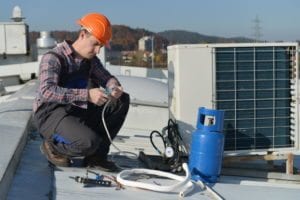Heating and air conditioning mechanics and installers make up a job family that most strongly resonates with the Strong Interest Inventory® Realistic theme. Individuals that pursue these career paths are known to enjoy building and repairing things. This job family also has secondary Conventional aspects related to the systematic nature of the job as well as associations with the Investigative Theme based on the analytical needs of the position. The nature of this employment field promotes a work style that is highly independent with a focus on attention to detail. The Strong Interest Inventory® sorts careers into six categories based on interest patterns and occupational preferences. It analyzes the examinee’s interests in a broad range of areas, and identifies their top Theme Codes. This allows individuals to find a career that is a good fit for them more easily than ever. Additionally, Realistic Theme Code careers tend to involve working with one’s hands to solve specific problems. They also favor working outdoors, especially in some kind of physical labor. People who score highly in the Realistic category tend to generally enjoy learning how and why things work.
Heating and Air Conditioning mechanics and Installers service, install, and repair air conditioning and heating systems in residential and commercial establishments. Heating and air conditioner mechanics need to be able to complete a wide range of technical tasks, from testing joints for leaks and electrical circuits for continuity, to changing filters and cleaning ducts. They also may adjust, install, or service thermostats, timers, or humidistats to maintain their proper functioning. In some cases, heating and air conditioner mechanics may need to discuss malfunctions with users or with their own supervisors in order to isolate problems and develop a solution that will work effectively for everyone. If the users are not sure of the problem, mechanics may need to survey the situation and recommend, develop, and perform maintenance procedures or repairs. Depending on the degree of repair needed, heating and air conditioner mechanics may need to install ductwork or radiator controls, as well as cut or drill holes in floors, walls, or even roofs to properly install equipment. Finally, heating and air conditioner mechanics need to ensure that all repairs are conducted according to local, state, and federal codes, as well as the manufacturer’s instructions of any hardware used.

Read about heating and air conditioner Mechanic’s salary & career info including required training and daily tasks.
In order to accomplish these tasks, heating and air conditioner mechanics need to use a wide range of tools, from basic wrenches, awls, pliers, hammers, pulleys, and circuit testers, to air velocity and temperature monitors, to hacksaws. Also, power tools like drills, saws, and grinders are heavily used. They may also need to be able to use magnetic pickup tools, or other hardware for picking up and transporting large, metallic items. Those who work in offices also need to be comfortable working with computers, printers, copiers, multi-line telephones, and other office equipment. Because much of the work done “in the field” is highly dangerous, mechanics should also be able to effectively use safety goggles, hard hats, scaffolding, gloves, and other protective equipment and clothing in order to protect themselves and others from harm. In addition to hardware, CAD software, facilities management software, and graphics software as well as Microsoft Office Suite, Adobe Systems, and Internet browser software are all extremely important. Most heating and air conditioner mechanics hold a post-secondary, or trade school certificate (over 50%). However, some hold an Associates (16%), and others have only a high school diploma (13%). Nonetheless, even more important than formal education are concrete skills: knowing how to use and maintain machines and tools, knowing materials and construction methods, having an intuitive understanding of physics and computers, and the most-forgotten “soft” skills of sales, marketing, and customer service. Together with physical strength, problem sensitivity, manual dexterity, and abstract visualization, these skills and innate strengths are vitally important to becoming a heating and air conditioner mechanic.
Heating and air conditioner mechanic’s salary varies widely depending on location and amount of experience. The best-paid mechanics in California can make over $80,000 annually, while in Texas, they would make only $61,000. The national average is $71,690. On the other hand, a heating and air conditioner mechanic’s salary is the lowest in Florida and Texas which are below $25,000 annually. That said, the employment rate for heating and air conditioner mechanics is projected to rise in 48 of the 50 states (all except North Dakota and West Virginia) before 2024—as much as 50% in Arizona and 40% in Colorado and Nevada.
Below are some employment trends for Heating and Air Conditioner Mechanics:
- Median Heating and Air Conditioner Mechanic’s Salary: $23.43 hourly, $48,730 annually
- Employment: 367,900 employees
- Projected growth (2018-2028): Much faster than average (11% or higher)
- Projected job openings (2018-2028): 42,800
Visit Our Strong Interest Inventory® Resource Page
Visit Our Myers-Briggs Type Indicator® Career Resource Database for Information on MBTI® Personality Type Careers
To Learn More About the Myers-Briggs Type Indicator, visit our About MBTI Test Page
Click on one of these to access more Realistic Theme Code Careers: Acupuncturist, Airline Pilot, Animal Trainer, Anesthesiologist Assistant, Baker, Barber, Bus Driver, Civil Engineer, Cardiovascular Technologist and Technician, Medical and Clinical Lab Technician, Computer Support Specialist, Game Warden, Forest Firefighter, Recreational Protective Service Worker, Meat Trimmer, Molecular and Cell Biologist, Nanotechnology Engineering Technician, Oral and Maxillofacial Surgeon, Pathologist, Plumber, Radiologist, Police Patrol Officer, Surveyor, Telecommunications Engineering Specialist, Veterinarian, Veterinary Technologist and Technician, Welder, Zoologist and Wildlife Biologist.
Explore our Strong Interest Inventory® Blog Pages:
- Strong Interest Inventory Realistic Theme Explained
- Strong Interest Inventory Artistic Theme Explained
- Strong Interest Inventory Investigative Theme Explained
- Strong Interest Inventory Social Theme Explained
- Strong Interest Inventory Enterprising Theme Explained
- Strong Interest Inventory Conventional Theme Explained
Assessment Categories
References
- Bureau of Labor Statistics wage data and 2012-2022 employment projections Onetonline.org










